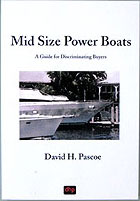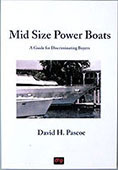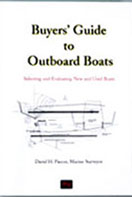Chapter 9
Power Options
Table of Contents
Diesel Myths
Gas Versus Diesel
The Safety Issue
Gas Engine Longevity
Diesel Maintenance Issues
Diesel Operating Issues
Who Really Needs Diesels?
Boat Size and Weight
Minimum Planing Speed Test
Diesel Engines
Diesel Power Ratings
Brake -vs- Shaft
Horsepower
Continuous -vs- Intermittent Power
Continuous -vs- Intermittent Duty
Revolutions Per Minute
Diesel Engine Reliability Experience by Manufacturer
Detroit Diesel
Caterpillar Engines
Cummins Diesels
Volvo Diesels
Yanmar Diesels
German Diesels
Gas Engines
GM Block Engines
An Important Rule for Internal Combustion Engines
Marinizing Companies
Mercruiser
Volvo Gas Engines
Transmissions
Reverse-Reduction Gears
Z-F Transmissions
Vee Drives
Stern Drives - The Bete Noir of Power Boating
Alternative Drive Systems
Engine Surveys
Diesel Engines
Gas Engines
Excerpt
In this power options section, we take a look at not only engine types such as gas and diesel, but also the various types of drive systems.
In this chapter you will find gas and diesel engine issues discussed concurrently. The reason for this is to provide a simpler means of comparison between the two types.
For many buyers, the choice of gas versus diesel simply boils down to a matter of price: A diesel engine with the comparable horsepower of a gas engine is about three times the cost of a gas engine.
Note: In this chapter I use American measures, cubic inches rather than liters, because most of us have a better feel for the system we are most familiar with, and to maintain consistency.
Not many people can judge the difference between a seven and eight litre engine because the numbers are so small. One litre equals about 61 cubic inches.
So why are diesels so much more expensive just because they burn a slightly different type of fuel? The main reason is due to higher internal pressures and stresses, followed by a more complex fuel system.
Gas engines are pretty simple engines and do not require the very high tolerances that a diesel does. For example, combustion chamber pressures in a gas engine normally run around 150 psi while in the diesel they are 500 psi. Gas engines also have fewer moving parts and the fuel systems are far cheaper.
Because of these high internal pressures, diesels develop more internal heat, heat that has to be removed by means of extra cooling devices.
Still another is that in order to achieve the kinds of horsepower that people want, diesels have to be turbo charged. Turbo charging uses the high flow of exhaust gasses to power a turbine that, in turn, is used to force air into the cylinders to improve aspiration. Exhaust gasses, of course, are hot, so the air has to be cooled by means of what is called an intercooler. This, alone, adds considerable cost to the engine.
There are still more factors that drive up costs, such as requiring a stronger drive train, meaning that things like propeller shafts and struts have to be bigger and stronger, and transmissions as well; engine foundations also have to be stronger with larger engine mounts.
- A Guide to Discriminating Buyers
by David H. Pascoe
Soft Cover
512 pages
Publisher: D. H. Pascoe & Co., Inc.
Published: 2003
Language: English
ISBN-10: 0965649636
ISBN-13: 9780965649636
In Stock
David Pascoe - Biography
David Pascoe is a second generation marine surveyor in his family who began his surveying career at age 16 as an apprentice in 1965 as the era of wooden boats was drawing to a close.
Certified by the National Association of Marine Surveyors in 1972, he has conducted over 5,000 pre purchase surveys in addition to having conducted hundreds of boating accident investigations, including fires, sinkings, hull failures and machinery failure analysis.
Over forty years of knowledge and experience are brought to bear in following books. David Pascoe is the author of:
- "Mid Size Power Boats" (2003)
- "Buyers’ Guide to Outboard Boats" (2002)
- "Surveying Fiberglass Power Boats" (2001, 2nd Edition - 2005)
- "Marine Investigations" (2004).
In addition to readers in the United States, boaters and boat industry professionals worldwide from over 70 countries have purchased David Pascoe's books, since introduction of his first book in 2001.
In 2012, David Pascoe has retired from marine surveying business at age 65.
On November 23rd, 2018, David Pascoe has passed away at age 71.







Normally orders ship the same day, if placed before 12:00 PM Eastern time.